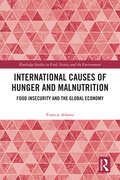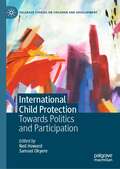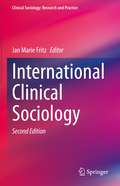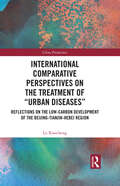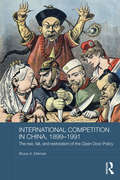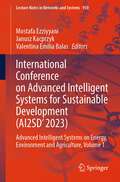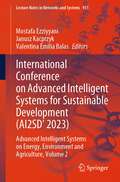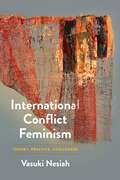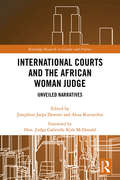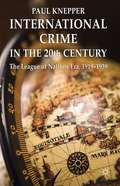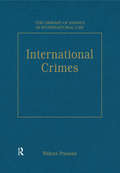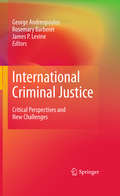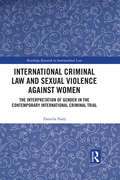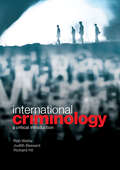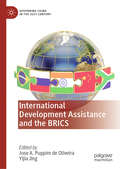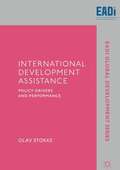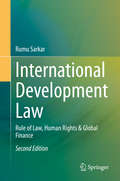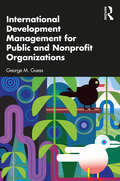- Table View
- List View
International Case Studies of Terrorist Rehabilitation (Routledge Studies in the Politics of Disorder and Instability)
by Rohan Gunaratna Sabariah M. HussinThe post 9/11 era has produced structured rehabilitation programmes in a wide range of countries including Saudi Arabia, Singapore, Pakistan, Malaysia, Egypt, Iraq, and Uzbekistan. There are also ad hoc and emerging programmes in Nigeria, China, Indonesia, Bangladesh, Denmark, Germany, United Kingdom, and Nepal. Due to the threat from global Islamist terrorist groups, including al-Qaeda and the Islamic State (IS), the focus has tended to be on Islamist groups. However, Sri Lanka also has a multifaceted rehabilitation programme that was created after the ethno-nationalist Liberation Tigers of Tamil Eelam (LTTE) group was defeated in 2009, which can teach us some valuable lessons. This book consists of a series of case studies of different terrorist rehabilitation initiatives that have been attempted around the world. Each initiative is critically analysed to develop a sound understanding of the significance of different approaches and strategies of terrorist rehabilitation in helping potential terrorists integrate back into society. Sharing and examining case studies, by both practitioners and scholars, this book provides vital tools to address the challenges faced by practitioners of terrorist rehabilitation programmes.
International Cases in Forensic Psychology: Inside the Criminal Mind
by K. Jayasankara ReddyThis book provides an in-depth investigation of different psychological phenomena in forensic psychology through an analysis of key case studies in the field.There is a growing requirement for a comprehensive resource that provides practical examples of how forensic psychology models are applied in real-life situations. Filling this lacuna, International Cases in Forensic Psychology takes the reader through a series of prominent case studies that illustrate the intricate details of criminal investigations, judicial proceedings, and correctional settings. Drawing on a diverse range of examples from the US, UK, Belgium, Russia, Columbia, Germany and India which include serial murder, financial deception and maternal psychosis, Dr. K. Jayasankara Reddy applies psychological theories and methods to understand the intricacies of criminal conduct. These theories range from criminal profiling and behavioral analysis, to the psychology of deceit and the dynamics of influence. Overall, the book will enhance the reader’s ability to analyses the fundamental reasons behind criminal behaviour and develop more efficient approaches for rehabilitating offenders.International Cases in Forensic Psychology will be of great interest to students and professionals of forensic psychology, neuropsychology, criminal justice, and related fields.
International Causes of Hunger and Malnutrition: Food Insecurity and the Global Economy (Routledge Studies in Food, Society and the Environment)
by Francis AdamsThis book examines the international causes of hunger and malnutrition and reveals how critical elements of the global economy heighten food insecurity in the developing world.At present, over two billion people in the developing world do not have secure access to safe, sufficient, and nutritious food. With the global population projected to rise to almost 10 billion by 2050, ensuring universal access to food will become increasingly urgent. The global community will need to redouble its efforts to effectively address the underlying causes of food insecurity. Within countries, a number of causes – poverty, poor governance, civil conflict, environmental decline - are immediately apparent and must be addressed to have any hope of lessening hunger and malnutrition. At the same time, a number of other factors well beyond national borders often constitute equal or greater obstacles to meeting the nutritional needs of all people. These factors are not nearly as visible and are largely outside the control of individual countries and local communities. This book examines how core elements of the global economy cause, prolong, and intensify food insecurity in the developing world. Emphasis is placed on agricultural trade, seed privatization, transnational land acquisitions, industrial fishing, and climate change. Understanding how these five factors impact the poorest communities in the poorest countries is essential for constructing an equitable, inclusive, and sustainable global food system that meets the nutritional needs of all people. By highlighting five major international causes of hunger and malnutrition, this book offers an alternate framework for understanding and combatting global food insecurity.This book will be of particular interest to students, scholars, and practitioners in the fields of global food security, international development, and global political economy.
International Child Protection: Towards Politics and Participation (Palgrave Studies on Children and Development)
by Neil Howard Samuel OkyereThis book interrogates the international child protection regime, with a particular focus on its weaknesses and failures. It looks at the lack of accountability, the normativity, and the tendency to recreate patterns of power and exclusion that blight otherwise good intentions. The book assesses why the regime falls short of its ideals and offers ideas for what can be done to improve it. Bringing together influential, established voices, and emerging scholars who work on issues related to childhood, youth, policy, and practice, the book offers a timely intervention that aims to push the world of international child protection in more progressive directions.
International Clinical Sociology (Clinical Sociology: Research and Practice)
by Jan Marie FritzClinical sociology is a multidisciplinary field that seeks to improve life situations for individuals and groups. This book showcases the art and science of clinical sociology from around the world. It is the first book to present basic clinical sociology diagrams and models in addition to detailed histories of clinical sociology in the United States, Quebec, France, and Japan. A range of interventions are discussed in light of a region’s economic, social, political, and disciplinary history. The book presents illustrative case studies from leaders in the field, and it serves the need of graduate-level courses from around the world.
International Collaborations In Behavioral And Social Sciences: Report Of A Workshop
by National Research Council of the National AcademiesBased on the outcomes of a workshop convened by the U.S. National Committee for Psychological Science and informed by a survey of social scientists who have led cross-national projects, this National Science Foundation-funded report addresses the multiple benefits of research extending across national boundaries and describes factors common among successful collaborations. Workshop participants identified the obstacles frequently encountered and suggested ways of dealing with these challenges to enhance international collaborative research in the behavioral and social sciences. Several dimensions of collaborative processes, such as research planning, methodological issues, organizational concerns, varied training approaches, and funding needs receive critical attention in this book.
International Communication: A Reader
by Daya Kishan ThussuThis comprehensive Reader brings together seminal texts in media and communication from both traditional as well as more recent scholarship. <p><p> Readings are drawn from an international range of scholars and organized to reflect the growing internationalization of the field, with clearly defined sections covering key aspects of global communication. In addition to the core academic readings, key policy documents are also included to demonstrate the development of the political, economic and technological infrastructure that underpins the global system of media and communication.
International Community Organising: Taking Power, Making Change
by Dave Beck Rod PurcellAs the Arab Spring continues to work through changes, the Occupy Movement is agitating for change and many are looking for alternatives in the face of global financial and political challenges, community organising offers a realistic way forward for many communities: a tried and tested way of improving people’s lives. This book is the first to explore the diverse history of community organising, telling stories of how it developed, its successes and failures, and the lessons that can be applied today. It analyses contemporary examples of practice from the USA, UK, India, South Africa, Cambodia and Australia against both wider theoretical frameworks and their ability to contribute to sustainable social change. It will be useful for a wide range of practitioners, students and researchers engaged in the struggle to develop new ways of doing community.
International Comparative Perspectives on the Treatment of “Urban Diseases”: Reflections on the Low-Carbon Development of the Beijing-Tianjin-Hebei Region (China Perspectives)
by Lu XiaochengWith an integration of theories, comparative and empirical studies, this book aims to find a treatment for Beijing’s “urban diseases” and coordinate a low-carbon development plan for the Beijing-Tianjin-Hebei region in China. Unprecedented industrialization and unconventional urbanization caused a series of “urban diseases” for developing cities across the globe. By summarizing and exploring the evolution and phased characteristics of “urban diseases”, the author implements theories across classical sociology, human ecology, community school, and low-carbon city as the base for policy recommendations. This book also provides in-depth examinations and comparative studies of other metropolises’ experiences in controlling “urban diseases”. Cities such as New York, London, and Tokyo were modeled to propose the most appropriate low-carbon development plan for the Beijing-Tianjin-Hebei region. With a focus on developing cities in Northern China, this book will be a great read to all scholars and students of environmental studies, development studies, urban studies, and contemporary China studies. It will also be a great addition for those who are interested in social conflicts and economic development.
International Competition in China, 1899-1991: The Rise, Fall, and Restoration of the Open Door Policy (Routledge Studies in the Modern History of Asia)
by Bruce A. EllemanChina's recent economic reforms have opened its economy to the world. This policy, however, is not new: in the late nineteenth century, the United States put forward the Open Door Policy as a counter to European exclusive 'spheres of influence' in China. This book, based on extensive original archival research, examines and re-evaluates China's Open Door Policy. It considers the policy from its inception in 1899 right through to the post-1978 reforms. It relates these changes to the various shifts in China’s international relations, discusses how decades of foreign invasion, civil war and revolution followed the destruction of the policy in the 1920s, and considers how the policy, when applied in Taiwan after 1949, and by Deng Xiaoping in mainland China after 1978, was instrumental in bringing about, respectively, Taiwan's 'economic miracle' and mainland China’s recent economic boom. The book argues that, although the policy was characterised as United States 'economic imperialism' during the Cold War, in reality it helped China retain its sovereignty and territorial integrity.
International Conference on Advanced Intelligent Systems for Sustainable Development: Advanced Intelligent Systems on Energy, Environment and Agriculture, Volume 1 (Lecture Notes in Networks and Systems #930)
by Janusz Kacprzyk Valentina Emilia Balas Mostafa EzziyyaniThis book is a comprehensive compilation of groundbreaking insights stemming from the esteemed International Conference on Advanced Intelligent Systems for Sustainable Development (AI2SD'2023), hosted at Cadi Ayyad University Morocco. Focused on the crucial themes of energy, environment, agriculture, and industry, this book captures the essence of transformative discussions and cutting-edge research that unfolded during the conference. Within these pages, readers are invited to explore the intricate world of intelligent systems, where innovation converges to tackle the key challenges of sustainability. The book immerses its audience in a wealth of knowledge that deeply represents the latest advancements shaping the future landscape. Diverse topics are intricately woven into the fabric of this discourse, covering AI-driven solutions designed for energy optimization, environmental sustainability, precision agriculture, and intelligent industry applications. Each contribution serves as a testament to the collaborative efforts of researchers, practitioners, and experts who gathered to drive innovation at the intersection of intelligent systems and sustainable development. Crafted as an invaluable resource, 'Advancements in Intelligent Systems: AI2SD'2023 Proceedings‘ caters to a diverse readership eager to delve into the forefront of trends and developments emerging from the crossroads of advanced intelligent systems in energy, environment, agriculture, and industry. Whether you're a researcher, practitioner, or enthusiast, unlock the transformative potential inherent in these innovative domains.
International Conference on Advanced Intelligent Systems for Sustainable Development: Advanced Intelligent Systems on Energy, Environment and Agriculture, Volume 2 (Lecture Notes in Networks and Systems #931)
by Janusz Kacprzyk Valentina Emilia Balas Mostafa EzziyyaniThis book is a comprehensive compilation of groundbreaking insights stemming from the esteemed International Conference on Advanced Intelligent Systems for Sustainable Development (AI2SD'2023), hosted at Cadi Ayyad University Morocco. Focused on the crucial themes of energy, environment, agriculture, and industry, this book captures the essence of transformative discussions and cutting-edge research that unfolded during the conference. Within these pages, readers are invited to explore the intricate world of intelligent systems, where innovation converges to tackle the key challenges of sustainability. The book immerses its audience in a wealth of knowledge that deeply represents the latest advancements shaping the future landscape. Diverse topics are intricately woven into the fabric of this discourse, covering AI-driven solutions designed for energy optimization, environmental sustainability, precision agriculture, and intelligent industry applications. Each contribution serves as a testament to the collaborative efforts of researchers, practitioners, and experts who gathered to drive innovation at the intersection of intelligent systems and sustainable development. Crafted as an invaluable resource, 'Advancements in Intelligent Systems: AI2SD'2023 Proceedings‘ caters to a diverse readership eager to delve into the forefront of trends and developments emerging from the crossroads of advanced intelligent systems in energy, environment, agriculture, and industry. Whether you're a researcher, practitioner, or enthusiast, unlock the transformative potential inherent in these innovative domains.
International Conflict Feminism: Theory, Practice, Challenges (Pennsylvania Studies in Human Rights)
by Vasuki NesiahAnalyzes the impact of International Conflict Feminism’s alliance with powerful global institutionsIn this book, Vasuki Nesiah tells the story of the astonishing uptake of International Conflict Feminism (ICF) in the most powerful institutions of global governance. ICF refers to a repertoire of policy agendas and legal strategies allied with those institutions to focus on women’s vulnerabilities, fight impunity for sexual violence, and promote women’s roles in peace-building processes. ICF emerged from feminist networks anchored in the Global North that gained momentum in the aftermath of the Cold War. Although this volume offers a testament to ICF’s remarkable success, it also analyzes how this success was intertwined with the defeat of alternative visions and agendas, including a range of dissident and heterodox feminisms that were eclipsed as ICF gained traction.Emerging from Nesiah’s dual occupations in academia and international law and policy practice, International Conflict Feminism shows how centrally the ICF agenda has shaped fields such as peace building, international criminal law, transitional justice, and post-conflict economic policy. Each section pauses at different sites in the international governance architecture to analyze the distributive impact of ICF and its allied global policy agendas to examine what is privileged, legitimized, and empowered, and what is subordinated, marginalized, and further excluded.ICF is a project of ideas and passions, legal proposals, and policy orientations. Today, when the most powerful countries of the world are describing their military, economic, and political interventions as a “feminist foreign policy,” the task of understanding and assessing the ICF project is especially urgent. Nesiah argues that, rather than obfuscating and denying the power of the ICF agenda, grappling with ICF’s power is essential to achieving solidarity with feminisms that don’t have a seat at the table, in particular those dissident feminist traditions with priorities and interests that challenge the dominant world order and its injustices and hierarchies.
International Courts and the African Woman Judge: Unveiled Narratives (Routledge Research in Gender and Politics)
by Josephine Jarpa Dawuni Hon. Akua KuenyehiaA sequel to Bauer and Dawuni's pioneering study on gender and the judiciary in Africa (Routledge, 2016), International Courts and the African Woman Judge examines questions on gender diversity, representative benches, and international courts by focusing on women judges from the continent of Africa. Drawing from postcolonial feminism, feminist institutionalism, feminist legal theory, and legal narratives, this book provides fresh and detailed narratives of seven women judges that challenge existing discourse on gender diversity in international courts. It answers important questions about how the politics of judicial appointments, gender, geographic location, class, and professional capital combine to shape the lives of women judges who sit on international courts and argues the need to disaggregate gender diversity with a view to understanding intra-group differences. International Courts and the African Woman Judge will be of interest to a variety of audiences including governments, policy makers, civil society organizations, students of gender studies, and feminist activists interested in all questions of gender and judging.
International Crime and Justice
by Mangai NatarajanInternational crime and justice is an emerging field that covers international and transnational crimes that have not been the focus of mainstream criminology or criminal justice. This book examines the field from a global perspective. It provides an introduction to the nature of international and transnational crimes and the theoretical perspectives that assist in understanding the relationship between social change and the waxing and waning of the crime opportunities resulting from globalization, migration, and culture conflicts. Written by a team of world experts, it examines the central role of victim rights in the development of legal frameworks for the prevention and control of transnational and international crimes. It also discusses the challenges to delivering justice and obtaining international cooperation in efforts to deter, detect, and respond to these crimes. This book is arranged in nine parts covering the subject matter of international criminal justice. Each of the short chapters provides readers with an understanding of the main concepts relevant to the topic and sensitizes them to the complex nature of the problems.
International Crime in the 20th Century
by Paul KnepperBetween 1919 and 1939, crime received a prominent place on the international public agenda. This book explores the blueprint for twenty-first century international crime prevention - The League of Nations approach - which established institutions for confronting dangerous drugs, traffic in women and terrorist violence.
International Crimes
by Gaurav SharmaThis volume makes accessible a selection of the most significant journal articles dealing with international crimes. The studies collected here will be an invaluable aid to teaching and research.
International Criminal Justice
by Rosemary Barberet James P. Levine George AndreopoulosIn recent years, justice-related and human rights issues have figured more and more prominently on the international political agenda. This expansion of the justice space is a product of a growing demand for accountability in world politics. Whether the issue is addressing heinous crimes such as genocide, war crimes and crimes against humanity in situations of armed conflict, confronting the inability or reluctance of governments to protect their own populations, or responding to the challenges posed by transnational terrorism; the international community has witnessed the proliferation of institutions and mechanisms, as well as the dynamic interplay between domestic and international processes, in the pursuit of justice-sensitive outcomes. International and hybrid tribunals, UN-led and domestic counter-terrorist initiatives, and the use of force for human protection purposes have demarcated the space within which ethical, political, and legal debates have unfolded in the quest for a more humane world order. The contributors of International Criminal Justice: Theoretical and Legal Perspectives address some of the most important issues and debates involved in this quest, and assess the merits of contending approaches to the promotion of international justice norms. This volume will contribute to the ongoing debate on the challenges, as well as opportunities, facing the justice agenda in its effort to shape developments in an increasingly interdependent world.
International Criminal Law and Sexual Violence against Women: The Interpretation of Gender in the Contemporary International Criminal Trial (Routledge Research in International Law)
by Daniela NadjThis book explores the prosecution of wartime sexual violence in international criminal law and asks what the juridicalisation of gender-based violence signifies for women. The book explores the portrayal of the various gendered identities that surface in armed conflict and it asks whether the law is capable of reflecting these in subsequent judgements. Focusing on the International Criminal Tribunal for the Former Yugoslavia and the International Criminal Tribunal for Rwanda as well as subsequent developments in the International Criminal Court, the book shows how the tribunals have delivered landmark jurisprudence in the area of sexual violence against women and provided a legacy for how gender justice is incorporated into international law. However, Daniela Nadj argues that in the relevant cases there is a tendency to depict women in monolithic fashion with little agency or sense of identity beyond their ethnicity. By bringing to the surface the complexity and multi-faceted gendered identities in wartime, the book calls for a reconceptualisation of notions of femininity in armed conflict.
International Criminal Law: Cases and Materials
by Roger Clark Ellen Podgor Lucian DervanInternational Criminal Law provides a set of teaching materials furnishing students with a grounding in the transnational issues likely to arise in federal criminal cases, and also in the law produced as a consequence of international efforts to impose criminal responsibility on the perpetrators of human rights atrocities. International Criminal Law offers, for teaching purposes, a collection of cases (mainly domestic) and other materials, together with notes and questions about those cases and materials. The Fourth Edition contains a new chapter on human trafficking.
International Criminology: A Critical Introduction
by Rob Watts Judith Bessant Richard HilInternational Criminology is an easy-access critical introduction to how conventional criminologists in the international arena think about and research crime. By using examples from the US, UK and Australia, the authors outline key ideas, vocabulary, assumptions and findings of the discipline while opening up a set of critical underlying issues and problems. From theoretical traditions to historical perspectives; contemporary criminology to reflexive criminology; this all encompassing text covers it all. This is the most valuable introduction to international criminology available for undergraduates and works as a superb refresher for more experienced students.
International Development Assistance and the BRICS (Governing China in the 21st Century)
by Yijia Jing Jose A. Puppim de OliveiraThis book aims to bring together a series of analyses on international development assistance in the BRICS, the group of countries that includes Brazil, Russia, India, China and South Africa. The BRICS states comprise approximately 3 billion people (~40% of the World’s population) and in terms of GDP account for 16.8 trillion dollars (~22% of the World’s economy). Over the last decade the loose coalition has evolved to become a formal partnership on both economic and political fronts. The first formal meeting of the then-four BRIC countries took place in 2006 during the United Nations General Assembly. This was followed in 2009 by the first summit of BRICS' heads of state, an event which has been convened annually ever since. On 3-5 September 2017, the ninth BRICS Summit was hosted in Xiamen, China. This book, an anthology of scholars based in BRICS countries, provides invaluable insights into the emerging global south coalition, and will be of interest to scholars, employees of NGOs, and China watchers.
International Development Assistance: Policy Drivers and Performance (EADI Global Development Series)
by Olav StokkeThis book provides a comprehensive search for the basic political drivers of international development cooperation, based on the policy and performance of the OECD countries from the early 1960s to the present. The author focuses on the stated and implemented policies of the four so-called frontrunners and the Western hegemon, scrutinizing the changing trends in the justifications, objectives and guidelines set for the policy and their evolving performance vis-à-vis the international ODA target. Through extensive research, the work examines predominant world-views, societal value systems and foreign policy traditions, in order to find the policy drivers that vary nation to nation and how development assistance has evolved globally.
International Development Law: Rule of Law, Human Rights & Global Finance (International Economic Development Law Ser. #Vol. 14)
by Rumu SarkarThis book describes how international development works, its shortcomings, its theoretical and practical foundations, along with prescriptions for the future. International Development Law provides the reader with new perspectives on the origins of global poverty, identifies legal impediments to sustainable economic growth, and provides a better understanding of the challenges faced by the international community in resolving global poverty issues. The text is structured into two basic parts: the first part deals with the theoretical and philosophic foundations of the subject, and the second part sets forth issues relating to the international financial architecture, namely, international borrowing practices, privatization, and emerging economies. In particular, the book provides new, innovative analysis on corruption as an impediment to sustainable development. The three interlocking facets of corruption are examined: transnational organized crime, Islamic-based international terrorism, and corruption within emerging economies and the international banking system. Thus fresh new analysis adds depth and clarity to a field that heretofore has been scattered and superficial. Finally, the “right to development” within the international human rights discourse is critically reviewed, particularly in light of new jurisprudence emerging from the African context.This book offers a fresh, new and balanced legal perspective on the development process. The text has been rigorously researched and has many practical facets based on the author’s professional experience within the international development field. It is an invaluable research and teaching tool since it takes a multidisciplinary approach to putting complex issues, legal trends and political questions into a clear, new perspective that is highly analytical as well as accessible to the reader. The author's elegant legal prose is both powerful and persuasive.
International Development Management for Public and Nonprofit Organizations
by George M. GuessManaging international development and aid programs often relies on trial and error and flexibility. Practitioners need a mix of management theory and field practice to prepare them for work in other countries—transitional, developing, wealthier, and poorer alike. Filling an important gap in the literature for graduate students and practitioners in the public sector, private firms, contractors, and nonprofit organizations that manage development assistance projects, this is a guide to dealing with core issues likely to be faced in doing field work.International Development Management for Public and Nonprofit Organizations offers an accessible primer on the basics of managing and motivating people, teams, and organizations. It focuses on challenges and opportunities to managing in difficult cultures and contexts, including hostile political regimes. The book takes a deeper look at management in four sectors: public finance, urban transport, K–12 education, and natural resources and the environment. Presented throughout the book are 28 cases, designed to stimulate critical discussions, as well as five technical exercises to allow integration of theory and practice. This textbook is supplemented by slides for teaching along with a sample syllabus. It is addressed to current and future international aid managers, including those enrolled in international management and international development courses at the university level. Professional development organizations, such as contractors, nonprofits, and donors, will also find the book a useful addition to their training materials.


